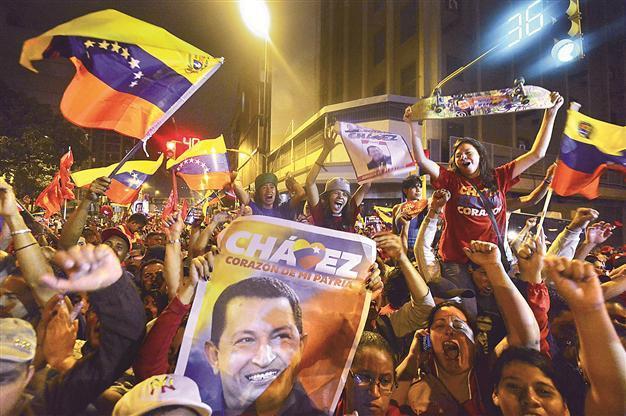Incumbent Chavez re-elected as president for six-year term
CARACAS

Venezuelan President Hugo Chavez’s supporters celebrate the victory in Caracas as Chavez (inset) waves a Venezuelan flag while speaking to supporters after receiving news of his reelection in the capital city. AFP photo
Venezuela’s socialist President Hugo Chavez has shrugged off cancer and a unified opposition to triumph yet again at the ballot box and claim another six-year mandate to pursue his oil-funded socialist revolution.
The election proved a sterner test than previous elections in Chavez’s 14-year tenure, but the anti-American leftist emerged victorious again despite health scares, growing discontent and a strong opposition challenge. With nearly all the votes counted, Chavez had 54.66 percent, compared to 44.73 percent, for his youthful opponent, former Miranda state governor Henrique Capriles. Turnout was a massive 80.94 percent of the 19 million eligible voters. It was Chavez’s third re-election in nearly 14 years in office. It was also his smallest victory margin. In 2006, he won by 27 percentage points. Chavez’s new six-year term begins in January.
‘Viva Venezuela! Viva the fatherland!’
Addressing thousands of cheering supporters from the balcony of his Miraflores presidential residence, Chavez sang the national anthem and vowed to be a better president after defeating opposition rival Henrique Capriles. “Viva Venezuela! Viva the fatherland!” the leftist leader cried. “The battle was perfect and the victory was perfect. I want to include everyone, including segments of the opposition,” the 58-year-old Chavez, wearing his trademark red shirt, said in a tacit acceptance of the best electoral showing against him yet.
But, brandishing the sword of his 19th-century idol, independence hero Simon Bolivar, he pledged to press ahead with a socialist revolution that has antagonized opponents, both at home and abroad. “Today we’ve shown that Venezuela’s democracy is one of the best democracies in the world, and Venezuela will continue its march toward the democratic socialism of the 21st century,” he said. “Viva Venezuela, viva the great fatherland, viva the Bolivarian Revolution!” leftist Ecuadoran President Rafael Correa tweeted, in words echoed by Bolivian leader Evo Morales and Argentina’s Cristina Kirchner.
Chavez declared himself free of cancer in July and intensified his campaign this past week, holding rallies across the country. Venezuelan opposition candidate Henrique Capriles congratulated Chavez and accepted defeat after the leftist leader was declared the winner of the presidential election. “To know how to win, you have to know how to lose,” Capriles said at this campaign headquarters.
Chavez will now have a freer hand to push for an even bigger state role in the economy and continue populist programs. He’s also likely to further limit dissent and deepen friendships with U.S. rivals. A new six-year term will extend his rule of the OPEC member state to two decades, giving him a chance to deepen his oil-revenue-fueled socialism while continuing to support left-wing allies in Latin America.
Since taking power in 1999, the former soldier has become a global flag bearer of “anti-imperialism,” gleefully baiting the U.S. government while befriending leaders from Iran to Belarus whom the West views with suspicion. At home, casting himself as an heir to independence hero Simon Bolivar, Chavez has poured billions of dollars in oil revenues into anti-poverty programs, and skillfully used his humble roots and folksy oratory to build a close connection with the masses.
